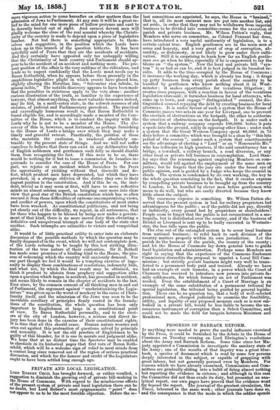PRIVATE AND LOCAL LEGISLATION.
Loup ROBERT CECIL has brought forward, or rather recalled, a Buggestion to diminish the growing evil of private bill-making in the House of Commons. With regard to the mischievous effects of the present system of private and local legislation there can be no doubt, but Lord Robert's most epigrammatic " point " does not appear to us to be the most forcible objection. Before the se- lect committees are appointed, he says, the House is "brained," that is, all its most eminent men are put into another list, and set aside, in order that they may not be withdrawn from imperial business to be divided into' committee-rooms for the execution of parish and private business. Mr. Wilson Patten's reply, that Members who serve on committee, as Colonel Pennant has done, have introduced a very useful uniformity of legislation, is to a certain extent true. English gentlemen are in the main men of sense and honesty, and a very great of crop of corruption, ab- surdity, or dishonesty, is not likely to grow under their culti- vation. Still it is surprising to learn how far an English gentle- man can go when he tries, especially if he is empowered to lay the blame on " the system." Now the local and private bill " sys- tem" is as bad as can be, and it is best judged in its broadest re- sults. It adds to the time occupied by the House of Commons ; it increases the working day, which is already too long ; it drags up petty business from every parish about the country to be handled by gentlemen who know nothing about it in West- minster; it makes opportunities for vexatious litigation ; it creates cross purposes, with a reaction in favour of the vexatious legislation aforesaid ; it furnishes business for local attorneys, who come up to town, and engage " distinguished " counsel, the dis- tinguished counsel repaying the debt by creating business for local attorneys. It is under favour of such a system that the House of Commons passes two acts in one year for Liverpool, one to prevent the erection of obstructions on the footpath, the other to authorize the erection of obstructions on the footpath. It is under such a system that a railway company expends 100,0001. before it puts a spade into the ground, solely in opposing other lines ; under such a system that the Great Western Company spent 40,0001. in 75 days before a committee which was brought to a close by "this late period. of the session "; under such a system that constituencies see the advantage of electing a " Lord" or an " Honourable Mr." who has influence in high quarters, if the said constituency has a bridge, a townhall, a railway branch, a road diversion, or any other local or private bill business in contemplation. Lord Stan- ley says that the reasoning against employing Members on com- mittees, would tell against the employment of the same men on juries ; but he forgets that the jury sits under the broad eye of public opinion, and is guided by a Judge who keeps the counsel in cheek. The system is condemned by its own working, the key to the whole question consisting in the fact, that it creates expense by compelling private business to be brought up from the country to London, to be handled by clever men before gentlemen who mean to do well, but who are easily diverted because they know little about the subject.
The enormous expense is something. Mr. Wilson Patten ob- served that the present system is bad for railway proprietors but advantageous for the public ; as if the public did not pay, directly or indirectly, every pound lost by proprietors or shareholders People seem to forget that the public is not concentrated in a me- tropolis, but is distributed over the country, and if the business of Bristol or Liverpool is sent up to be badly executed in Westmin- ster, the loss falls upon the public.
The clue out of the entangled system is to sever local business from national business ; to refer back to each division of the country matters properly within its own jurisdiction. Let the parish do the business of the parish, the county of the county; and let the House of Commons lay down general laws to guide local legislation and administration. Perhaps some Members are right in saying that the experience of the Commons Enclosure Commission discredits the proposal to appoint a Local Bill Com- mission ; but strictly private business might very well be trans- ferred to a permanent body paid and trained. Already we have had an example of such transfer, in a power which the Court of Chancery has received to introduce new powers into private fa- mily settlements, for which formerly an act of Parliament was needed. Even the establishment of a Court of Marriage is an example of the same substitution of a permanent tribunal for special legislation, the tribunal being guided by general legisla- tion. There can be no question too, that a body of well-selected professional men, charged judicially to examine the feasibility, utility, and legality of any proposed. measure such as is now em- bodied in a private bill, would be less liable to become the un- conscious instrument of corruption than a Select Committee, and could not be made the field for bargain between Ministers and Members.






























 Previous page
Previous page